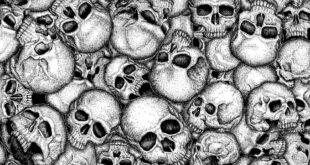Brenda Walker
VDARE
October 23, 2014
The Netherlands has a bad problem with Muslim unfriendlies, just like the rest of Europe. But the Dutch are lucky in having a political leader, member of Parliament Geert Wilders (pictured below), who is willing to fight for western freedoms against sharia.
In the present example, Wilders and the Freedom Party which he leads are the main impetus for the government’s cracking down on illegal immigration and taking the threat of local jihadists seriously.
Unfortunately, Wilders’ defense of western values has come at great personal cost: because of the many threats on his life from hostile Muslims he has lived for the last decade with 24/7 security. (Video transcript here.) He has also been tried twice in Dutch courts for committing free speech about Muslim immigration.
Ignoring all the Muslim-caused problems for a second, it’s kind of shocking that Europe’s most densely populated country is still admitting immigrants and refugees. At a certain point, overpopulated countries should just say “Enough, no more, we’re full.” But the European Union wouldn’t permit that.
Dutch battle surge of desperate, violent Muslim refugees, Washington Times, October 19, 2014
Geert Wilders’ Freedom Party pushes government’s hard-line immigration stance
THE HAGUE — Nasir Galid fled Somalia hoping for a better, safer life. Instead, he died in an Amsterdam hospital five days after being attacked in a garage where he was living with other homeless immigrants.
Galid, 26, was one of about 100 refugees who have been roaming the Dutch capital for more than two years, occupying empty offices, abandoned garages and a disused church. All of them were supposed to have left the country after Dutch authorities rejected their asylum claims.
Police arrested two men, both in their early 30s, shortly after Galid’s assault in August. It’s not clear why Galid was attacked, but Pim Fischer, a Haarlem lawyer who represents some of Galid’s fellow refugees, said many of them are desperate and violent.
“Many of them are traumatized by their experiences, and they are being offered no future,” Mr. Fischer said. “The risks are very high.”
The Dutch Refugee Council estimates that 100,000 people live illegally in the Netherlands. Many are asylum seekers who are supposed to leave the country within 24 hours after the government rejects their requests to remain. Instead, they take over abandoned buildings as squatters or set up makeshift shelters.
The problem is expected to grow. A record 137,000 people moved to the Netherlands from other countries in 2013, though most were legal immigrants in a country that hosts many European headquarters of multinational corporations.
Since 2008, the Dutch government has taken an increasingly hard line on immigration as officials try to allay public concerns about overcrowding in Europe’s most densely populated nation.
Right-wing populist leader Geert Wilders has played an outsized role in the debate.
Mr. Wilders‘ anti-immigrant Freedom Party has been the third-largest group in the past two Dutch elections, in 2010 and 2012. He has used that position to pressure the government to “de-Islamize” the Netherlands, where Muslims make up about 5 percent of the population of 16.8 million.
His latest campaign, announced last month, calls for everyone holding a passport from a Muslim-majority country to sign a declaration formally renouncing Shariah law.
“If they don’t do that, there should be no place for them in the Netherlands,” Mr. Wilders said in a parliamentary debate. “Shariah is hate.”
From 2010 through 2012, Dutch prime ministers have relied on the votes of the Freedom Party to stay in power. In return, Mr. Wilders has secured concessions in a range of policy areas, including immigration.
His proposals to block arrivals from Islamic countries, tax Islamic headscarves and impose a Swiss-style ban on new minarets at mosques failed, but he made his mark in other ways.
Three years ago, NATO asked the Netherlands to accept 250 Libyans wounded in the North African country’s civil war. After Mr. Wilders protested, the number was reduced to 52.
“I have no desire to put casualties from an Islamic country in a Dutch hospital,” he said at the time.
Unrest in the streets of The Hague over the summer has bolstered Mr. Wilder’s position. In July, two demonstrations against Israel’s intervention in the Gaza Strip became rallies in support of the Islamic State. The terrorist group’s supporters waved black flags and cheered speeches denouncing “the damned Jews, the damned Zionists, the damned occupiers of Muslim countries.”
In response, a far-right group calling itself Pro Patria (For the Fatherland) marched in August in Schilderswijk, a district in The Hague where 90 percent of residents are foreign-born. Police had to halt the march after a group of residents began throwing stones at the Pro Patria members. The Hague Mayor Jozias van Aartsen has since banned demonstrations in the suburb.
“Our demonstrations are aimed at radical Muslims, not against Islam,” Pro Patria organizer Patrick Schouten told De Volkskrant, a Dutch newspaper. “We want stronger action against Muslim extremism.”
Dutch moderates also have voiced concerns about the spread of radical Islam in the Netherlands.
The Dutch General Intelligence and Security Service estimates that 140 Dutch Muslims have gone to Syria to fight in the civil war. The agency’s head of counterterrorism, Dick Schoof, said the 30 combatants who have returned pose a “substantial” risk to the country.
Interior Minister Ronald Plasterk warned recently that 1,000 jihadist sympathizers were concentrated in 10 neighborhoods across the country.
Officials are proposing to strip Syria fighters of their Dutch nationality whenever possible — international law does not allow governments to render people stateless — or cancel their passports.
Syrian refugees also have strained the Netherlands‘ asylum system. Since the start of the year, more than 6,000 refugees from the war have arrived. Junior Justice Minister Fred Teeven warned this month that the converted barracks and former prisons housing asylum seekers are at full capacity.
The government has appropriated an extra $480 million to build more accommodations, but the Dutch Refugee Council says additional action is needed to ensure that refugees do not end up on the streets or in squats like the one where Galid stayed, with no hot water, intermittent electricity and exposed wiring.
“As long as the Dutch government says they have to return, they are illegal and they end up living on the street,” said council spokeswoman Anneriek Dekker. “If someone has been turned down for asylum, they should be given shelter for as long as it takes. That’s the only way they can focus on the possibility of returning home.”
 Daily Stormer The Most Censored Publication in History
Daily Stormer The Most Censored Publication in History


